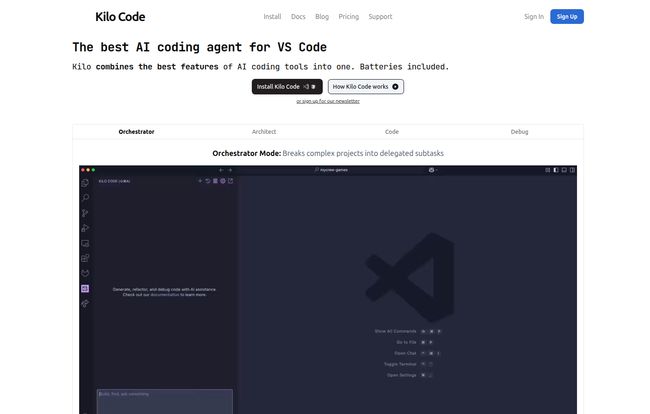The AI coding assistant space is getting crowded. It feels like every week there's a new 'revolutionary' tool promising to write all my code, fix my bugs, and probably make me a perfect cup of coffee. I’ve been in the SEO and traffic game for years, and I’ve seen trends come and go, but the AI gold rush is something else entirely. We've all tried them, right? Some are pretty good at autocompleting a line or two. Others... well, they feel like you're talking to a well-meaning intern who just read a 'Learn to Code in 24 Hours' book.
My biggest gripe? The walled gardens. The black boxes. You feed your precious, proprietary code into the machine and just hope for the best. You pay a subscription fee that feels a bit like a protection racket, and you're never quite sure what's happening behind the curtain. Is it learning from my code? Will the pricing change next month? It's exhausting.
And then Kilo Code waltzes in. Not with a bang, but with a quiet, confident 'Hey, what if we just... made sense?' It’s an open-source AI coding agent for VS Code that feels less like a product and more like a philosophy. And frankly, it’s a breath of fresh air.
So What Exactly is This Kilo Code Thing?
At its heart, Kilo Code is a VS Code extension. But calling it just an 'extension' is like calling a Swiss Army knife 'a blade'. It’s an AI agent designed to be your partner through the entire development lifecycle. It’s built on a pretty solid foundation, being a fork of Roo Code, which itself is a fork of Cline—two of the most popular open-source alternatives out there. So, it's not built from scratch on a whim; it has pedigree.
What Kilo does is combine the best features of a bunch of different tools into one cohesive package. It’s not just about generating code; it’s about understanding the entire workflow.
The Four Horsemen of Your Workflow: Kilo's Agent Modes
This is where things get interesting. Kilo isn't a one-trick pony. It has different 'modes' you can switch between depending on what you're doing. It’s like having a project manager, an architect, a coder, and a QA tester all living in your VS Code, ready to jump in. Not as a noisy committee, but as a coordinated team.

Visit Kilo Code
Orchestrator Mode: The Project Manager
Got a big, hairy, audacious goal? Start here. The Orchestrator mode is your high-level strategist. You give it a complex task—like "build me a user authentication system with social logins"—and it breaks it down into smaller, manageable subtasks. It then delegates those tasks to the other modes. It's the brains of the operation, making sure the right agent is doing the right job.
Architect Mode: The Big-Picture Thinker
Once the plan is in place, the Architect mode steps in. This is where the solution design happens. It figures out the structure, the necessary files, the dependencies, and the overall blueprint of what needs to be built. It's the silent partner that prevents you from painting yourself into a corner five hours into a coding session.
Code Mode: The Workhorse
This is what most people think of when they hear 'AI coder'. The Code mode takes the architect's plans and starts writing. It implements the features, writes the functions, and fleshes out the logic. It’s your hands-on pair programmer, churning out the boilerplate and the complex algorithms so you can focus on the more creative aspects of the problem.
Debug Mode: The Problem Solver
We all create bugs. It's a fact of life. Kilo’s Debug mode is designed to be your first line of defense. It can go through your codebase with a fine-toothed comb, find where a bug is coming from, and suggest fixes. No more `console.log('here 1')` all over the place. Let the AI handle the grunt work of tracking down that pesky off-by-one error.
Why I'm Genuinely Excited About Kilo Code
Okay, the features are cool. But lots of tools have cool features. What makes Kilo stand out for me are the principles behind it.
First and foremost, it is truly open source. This isn’t 'source-available' or 'free for personal use' with a bunch of asterisks. It means no lock-in. It means you can see exactly how it works. And most importantly for me, it means no training on your data. Your code remains your code. Full stop. You can bring your own API keys for services like OpenAI or Anthropic, or even use a local model running on your own machine. That level of control is just... chef's kiss.
Then there's the memory. We've all had that frustrating experience of explaining the same context to an AI over and over again. Kilo has a 'Memory Bank' that keeps a record of what it's worked on, your preferences, and the context of your application. It’s like it actually remembers the conversation you had yesterday. A small thing, but it makes a massive difference in usability.
And let's talk about the pricing model, because it’s almost ridiculously fair.
The Pricing Model We Deserve
This is simple. The Kilo Code extension itself? Free. As in, actually free. Open source.
The cost comes from using the Large Language Models (LLMs) that power the AI's 'brain'. But here's the kicker: Kilo takes no commission. You pay the exact token price that the providers (like Anthropic, OpenAI, or Google) charge. They even integrate with OpenRouter to give you access to a ton of models without any markup. They even give you a $20 credit to get started. It feels honest. It feels like a tool built by developers, for developers, not a cash grab wrapped in a fancy UI.
For bigger teams, they have an Enterprise plan in the works with features like audit logs and role-based access control, which makes perfect sense for corporate environments.
Okay, But Is It Perfect? The Potential Downsides
No tool is perfect, especially a relatively new one. I wouldn't be giving you a real review if I didn't mention the potential bumps in the road. Kilo Code is still a new project, which means there could be undiscovered bugs. It's the nature of the beast with any new software.
Also, while they've done a great job making it accessible, some of the more advanced customizations—like setting up a unique local model provider—might require a bit more technical know-how. And as mentioned, the full suite of enterprise features is still on the roadmap, so if you're a C-level exec looking for immediate deployment in a 500-person company, you might need to wait a beat.
Oh, and they make a claim of 'Hallucination-free code'. As an industry veteran, my eyebrow went up. That's a very bold claim. Their approach involves having the AI check library documentation and run test suites to validate its own output, which is brilliant and definitely reduces errors. But 'free'? I'd say it's more 'hallucination-resistant', which is still a massive win in my book. Just maintain a healthy dose of professional skepticism, as you should with any AI.
Conclusion: Is Kilo Code Your Next Co-Pilot?
After playing around with Kilo Code, I’m left with a strong sense of optimism. It’s not just another AI tool; it’s a statement. It’s a move back towards the open, collaborative spirit of software development. It gives the power back to the developer, offering unparalleled flexibility, transparency, and control.
Is it for everyone? If you want a simple, one-click, pay-your-$20-a-month-and-don't-think-about-it solution, maybe not. But if you’re a developer who values control, who wants to use the best model for the job, who is tired of proprietary black boxes, and who believes in the power of open source, then I think you'll be seriously impressed. Kilo Code isn’t just a tool; it’s the AI coding agent I feel like we’ve been waiting for.
Frequently Asked Questions
- How did Kilo Code get started?
- Kilo Code has a cool open-source lineage. It started as a fork of Roo Code, which itself was a fork of Cline. The team behind Kilo is building a superset that includes the best features of both, while regularly contributing improvements back to the original projects.
- Is Kilo Code really free to use?
- The VS Code extension itself is completely free and open-source. You only pay for the computational cost of the AI models you choose to use, at the exact rate the provider charges, with no commission or markup from Kilo. Plus, they give you $20 in free credits to start.
- Will Kilo Code train its AI on my private code?
- No. This is one of their core principles. Kilo Code is fully open, has no lock-in, and does not train on your data. Your code remains private.
- What AI models can I use with Kilo Code?
- You have a lot of flexibility. You can connect to major providers like OpenAI (GPT-4, etc.), Anthropic (Claude 3), and Google. You can also bring your own API keys, or even connect to a free or local model running on your own hardware for maximum privacy.
- How is this different from something like GitHub Copilot?
- While both are AI coding assistants, the philosophy is different. Copilot is a closed-source product with a set subscription fee. Kilo Code is an open-source agent framework. It offers more control over the models you use, a transparent pay-as-you-go pricing model (with no markup), and a core commitment to never training on your code.
- Who is the team behind Kilo Code?
- Kilo Code is built by a team of developers, including JP, Justin, Darko, Brendan, and others, with help from contributors in the open-source community. They are a remote-first team with offices in SF and Amsterdam.
Reference and Sources
- Kilo Code Official Website
- Kilo Code Pricing Information
- Kilo Code on GitHub (Note: Link is illustrative, actual repo URL might differ)



